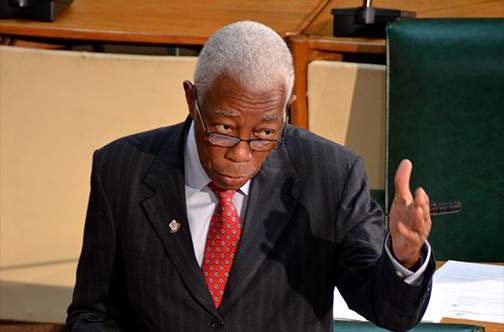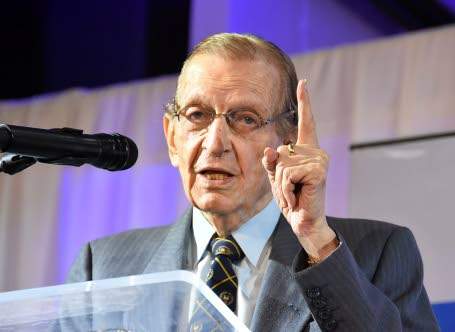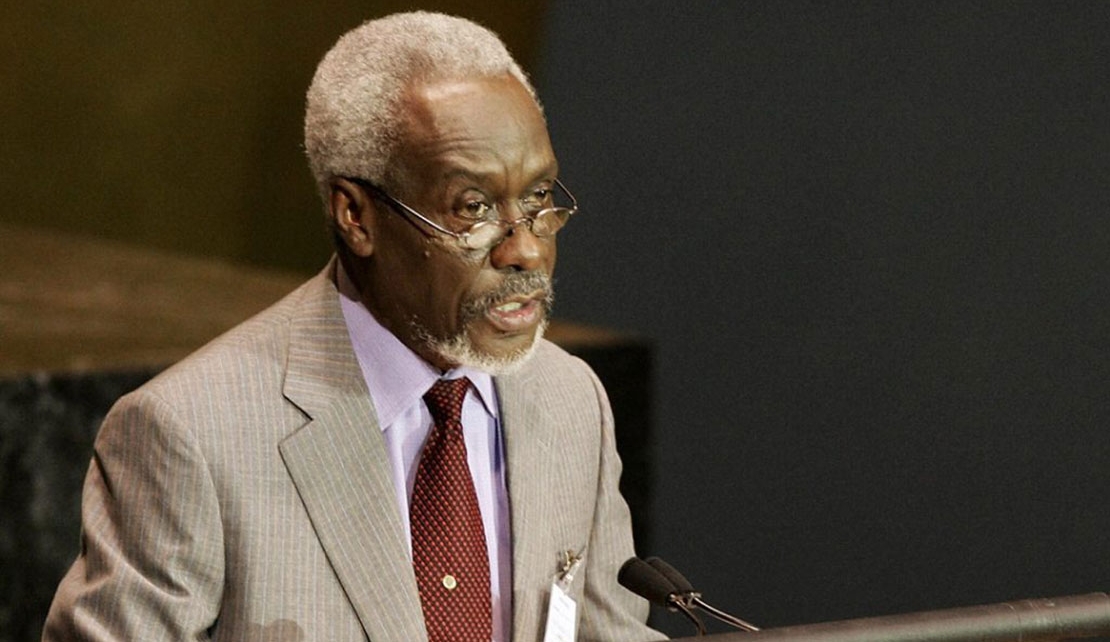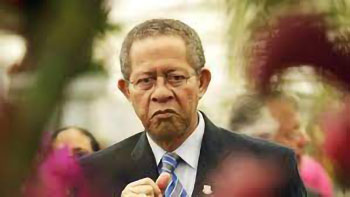JAMAICA | A. J. Nicholson recalls the bumps on the rocky road to Constitutional Independence

Recent evolutionary happenings in the island nation of Barbados have given rise to a welcome stir within the region. The Jamaica Observer editorial of Wednesday, December 1, wondered whether Jamaica would "follow the course set by Barbados" in completing the circle of independence by moving away from the monarchy to become a republic within the Commonwealth.

Abandoning the British Monarch as Head of State is the most transformational constitutional change that can be contemplated under the Westminster system of government that has been adopted by both countries. And the editorial, in its first sentence, emphasized the unified approach that was adopted by Barbados in the exercise.
Constitutional reform is required to bear the stamp of manifest general unity and agreement evidenced, in particular, by the co-operative approach taken to the initiative by the country's political parties. In every material particular, the authorities in the Barbadian society have been faithful to that essential prerequisite, and in exemplary fashion.
Unfortunately, that has not been the case in the Jamaican experience; hence the profound significance of the Observer editorial query. Recall that the history strongly suggests that, for the vast majority of Jamaicans, the life of their forbears here in the Caribbean began in Barbados.
Situate as the land bridge between West Africa and the other Caribbean teritories, it is said that Barbados was the first stop for slaves who, themselves or their descendants, were thereafter shipped off to places like Jamaica and the southern states of America. And, for the present generation of Jamaicans, Barbados has now provided the telling example of being a bridge from British imperialism to full independence.

The Observer editorial also intoned: "We are unclear as to whether Prime Minister Andrew Holness's comments at the JLP's national conference that his Government was intent on a review of the Constitution come next year, was in any way affected by events in Barbados". Candidly, in Jamaica, we are also unclear as to the message that the prime minister intended to send by that announcement.
By "review", he certainly could not have been seeking to project an inquiry into the necessary areas of reform to the Constitution. For, such a comprehensive exercise had been undertaken and the recommendations agreed by both parties in Gordon House over a quarter century ago.
Has Justice Minister Delroy Chuck not advised the prime minister that, in the early 1990s, a Constitutional Commission under the chairmanship of the Honourable James Kerr, conducted islandwide consultations on the kinds of reform that the Jamaican people would wish to witness for improved provisions to the Independence Constitution?
Mr Holness should be alerted that the recommendations that were put forward in the Report of that Kerr Commission subsequently informed the deliberations and Final Report of a Joint Select Committee of Parliament on Constitutional and Electoral Reform, chaired by the Honourable David Coore.
The wide-ranging recommendations contained in that Final Report were presented to, and approved by, both Houses of Parliament without any demurrer coming from either side of the aisle, early in the extensive Patterson Administration, in 1995.
That consensus position which was cemented in the parliament was a signal that the reform process was on in earnest, but it also soon proved to be the end of the essential political co-operation required for a successful outcome by following the kind of unified "course set by Barbados".
From the array of recommendations in the Final Report there are perhaps three that would be most impactful in relation to the new system of government: the agreement for Jamaica to become a republic with its own indigenous president as Head of State; for Jamaica to delink from the British Privy Council and to subscribe to a regional final court of appeal; and for a modernised fundamental rights Chapter in the Constitution.
An appropriate time for the holding of a referendum to satisfy the constitutional requirement for Jamaica to become a republic would have to be decided by mutual agreement after mechanisms had been agreed upon for how the president was to be chosen and for full explanation to the public of what the proposed change entailed.

A determination that the reform process should continue apace impelled Prime Minister Patterson to have two committees established. The first, a Joint Select Committee of Parliament, essentially to make appropriate recommendations from which a constitutional amendment Bill could be drafted to provide for the new fundamental rights Chapter.
The second was a broad-based preparatory committee, which included representation to be drawn, for example, from the Bar, the church fraternity, the parliamentary Opposition, academia, the trade union movement, among others, to examine and deliberate upon suggestions concerning the establishment of the proposed regional final appeal tribunal.
And as the then Attorney General, I was entrusted with the chairmanship of both committees. The development of the new rights Charter by the membership of the Joint Select Committee received the full co-operation of both political parties.

For all practical purposes, the work of the Joint Select Committee had been completed before the amendment Bill was tabled and passed during the prime ministership of Bruce Golding with the full co-operation of the then PNP Opposition for its approval in both Houses of Parliament.
An adjunct proposal by Mr Seaga for the establishment of the Office of the Public Defender was also accepted and completed during the Patterson Administration. But unfortunately, the united, co-operative spirit did not extend to the workings of the broad-based committee that was established to deliberate upon issues regarding the creation of the regional final court of appeal.
The Opposition Leader duly accepted the prime minister's invitation to name representatives to serve as members of the preparatory committee. Neither of his two nominees, however, attended even a single meeting of the committee.
Indeed, the broad agreement from every quarter that had existed in Jamaica along the independence journey since the 1960s concerning delinking from the Privy Council came to an abrupt end in the late 1990s with the decision of the JLP that they were no longer in support of Jamaica acceding to the jurisdiction of the proposed regional court.
Through their leader, Mr Seaga, there was to come a stipulation for an unrequired and potentially highly disruptive referendum to be held for the issue to be decided but that, in any event, their party would not support Jamaica acceding to the regional court since it was their expressed view that "pure justice came from the Privy Council".
And so, by such means, the essential prerequisite of a united approach to the process of constitutional reform was derailed by one of the major political parties in Jamaica.
The sensible, logical path chosen by Barbados was for movement away from the Privy Council before embarking on the final step toward republican status, for there was clear awkwardness involved in ditching the British Monarch as Head of State while continuing to seek final justice from the British court, a situation which Dominica recently moved to regularise.
For Jamaica, there was an added powerful reason to accede to the jurisdiction of the regional court as a matter of urgency. The thinking was that it would be far more appropriate within the broad compass of reform that, while thankful recognition is due for the service that the British court has rendered, particularly along the independence journey since 1962, the provisions of the new and improved Charter of Fundamental Rights and Freedoms should come to be interpreted and adjudicated upon by judges who were attuned to the cultural heritage and way of life within this regional space.
There also exists another reason for scepticism on the part of the public concerning the prime minister's announcement at the JLP's national conference concerning a "review" of the Constitution. That reason lies in the scant regard and disrespect shown by the JLP to the provisions and the spirit of the Constitution and the laws of Jamaica in recent times.

Memories of the debacle arising from disobedience to the provisions of the law relating to extradition in the "Dudus" Coke episode do not recede easily. And, perhaps the most egregious example arose with the brazen attempted corrupt manipulation of the constitutional provisions relating to membership of the "unelected" Upper House of Parliament, in a most unworthy effort to thwart legislative approval of the Bills to enable Jamaica to accede to the appellate jurisdiction of the Caribbean Court of Justice.
Even in this present moment, it has been asserted that there are before the courts legal issues relating to the declaration of states of emergency pending final determination. For the executive to have gone ahead to making such further declarations in the interim was not a display of good form, and certainly not a show of respect for the sub judice rule.

So, that is the background against which the editorial question can be truthfully answered and within which Mr Holness's promise of review of the Constitution has to be contemplated. But the crowning Barbados template is available: Table in the House of Representatives the Bills to enable Jamaica to join Guyana, Barbados, Belize and Dominica in the historic move away from the British Privy Council to embrace the appellate jurisdiction of the regional court.
If that initiative is embarked upon in short order, with both government and opposition members of each House, at the appropriate time in unison voting in favour, that seminal segment of constitutional reform, without any cost to the treasury, would be put behind us during the year of celebration of the 60th anniversary along the independence journey.
In the meantime, a preparatory committee could be established for plans to be put in place for Jamaica to become a republic. That preparatory committee would place itself in a position, after consultation with relevant entities, and perhaps also guided by the challenges of the pandemic, among others, to recommend a time and a framework within which the required referendum could be held and for the voting public to be accordingly properly sensitised.
That committee would also make recommendations concerning how the other agreed outstanding areas of constitutional reform might be dealt with.
By taking those steps, Jamaica would be signalling an adoption of the cerebral approach that attended the course set by Barbados. That would amount to giving life to the Observer editorial question in which, I apprehend, is embedded a sense of expectation that the same course will indeed be followed.
The answer, then, to that question will soon be made known when Mr Holness, in the face of the wave of regressive conduct of the JLP in that arena in recent times, reveals what is envisaged in the conduct of his promised "comprehensive review of the Constitution".
